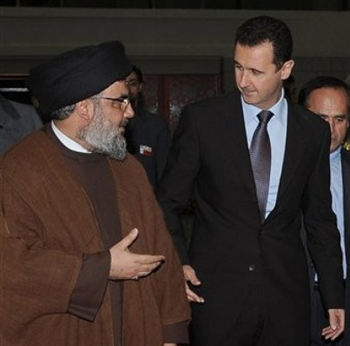Hezbollah Steers Lebanon Closer to Syria, Straining Efforts to Stay Neutral/حزب الله يأخد لبنان أكثر وأكثر باتجاه النظام السوري
Reuters/August 11/17
BEIRUT — Hezbollah and its allies are pressing the Lebanese state to normalize relations with President Bashar al-Assad’s government in Syria, testing Lebanon’s policy of “dissociation” from the Syrian conflict and igniting a political row. Calls for closer ties with the Syrian government, including on refugee returns and military operations on the Lebanon-Syria border, come as Assad regains control of more territory from insurgents and seeks to recover his international standing. The Lebanese policy of “dissociation”, agreed in 2012, has aimed to keep the deeply divided state out of regional conflicts such as Syria even as Iran-backed Hezbollah became heavily involved there, sending fighters to help Assad, who is also allied to Iran. The policy has helped rival groups to coexist in governments bringing together Hezbollah, classified as a terrorist group by the United States, with politicians allied to Iran’s foe Saudi Arabia, underpinning a degree of political entente amid the regional turmoil.
While Lebanon never severed diplomatic or trade ties with Syria, the government has avoided dealing with the Syrian government in an official capacity and the collapse of the policy would be a boost a political boost to Assad. It would also underline Iran’s ascendancy in Lebanon, where the role of Saudi Arabia has diminished in recent years when it has focused on confronting Tehran in the Gulf instead. Assad’s powerful Lebanese Shi’ite allies want the government to cooperate with Syria on issues such as the fight against jihadists at their shared border and securing the return of the 1.5 million Syrians currently taking refuge in Lebanon. “Everybody recognizes (the dissociation policy) as a farce to some extent, but at least it contained the conflict and prevented Lebanon from being dragged even further into what is going on in Syria,” said Maha Yahya, director of the Carnegie Middle East Centre in Beirut.
“(A normalization of relations) would be viewed as a victory, if using sectarian terms, of Shi’ites versus the Sunnis and will just inflame tensions even more.”Lebanon’s relationship with Syria has for decades set rival Lebanese against each other. Syria dominated its smaller neighbor from the end of its 1975-90 civil war until 2005. A row erupted this week because of plans by government ministers from Hezbollah and the Shi’ite Amal party to visit Damascus next week.
Although the government has refused to sanction the visit as official business – citing the dissociation policy – Industry Minister Hussein Hajj Hassan, a Hezbollah member, has insisted they will be in Damascus as government representatives.”We will meet Syrian ministers in our ministerial capacity, we will hold talks over some economic issues in our ministerial capacity, and we will return in our ministerial capacity to follow up on these matters,” Hassan told al-Manar TV. Samir Geagea, a leading Lebanese Christian politician and longstanding opponent of Hezbollah and Syrian influence in Lebanon, has said the visit to Syria will “shake Lebanon’s political stability and put Lebanon in the Iranian camp”.A senior Lebanese official allied to Damascus described the row as “part of the political struggle in the region”. The influence of Iran’s allies in Lebanon was shown last year by the selection of a longtime ally of Hezbollah, Christian politician Michel Aoun, as head of state in a political deal that also installed Saudi-allied Sunni Prime Minister Saad al-Hariri.
SYRIAN RETURNS
Hezbollah has recently stepped up calls for the Lebanese government to engage directly with Damascus over the return of Syrian refugees, who now account for one in four of the people in Lebanon and are overwhelmingly Sunni Muslim. The issue is of enormous political sensitivity in Lebanon, although all politicians agree they must return to Syria due to strains on Lebanon’s resources and risks to its sectarian balance. Hariri has said Lebanon will only coordinate refugee returns with the United Nations, which says there can be no forced return of people who fled the conflict, many of whom fear returning to a Syria governed by Assad.. But one branch of the Lebanese state, the powerful internal security agency General Security, recently held talks with the Syrian authorities to secure the return of several thousand Syrians into Syria following a military campaign by Hezbollah in the northeast border region.
General Security says the refugee returns have been voluntary. The United Nations has had no role in the talks. An expected Lebanese army assault on Islamic State militants at the border with Syria has been another focal point for the debate over cooperation with Damascus. The army, a recipient of U.S. aid, has said it will lead the battle alone in Lebanese territory, and does not need to coordinate with other parties. Hezbollah leader Sayyed Hassan Nasrallah has said his group and the Syrian army will mount a simultaneous assault against IS from the Syrian side of the frontier, however. “Practically speaking, the dissociation policy is finished,” said Nabil Boumonsef, a columnist with the Lebanese newspaper An-Nahar.
But he warned of the political ramifications in Lebanon, saying “political score settling” by one party against another would create “a big problem” in the country.
(Reporting by Lisa Barrington; Additional reporting by Laila Bassam; Editing by Tom Perry and Sonya Hepinstall)






















